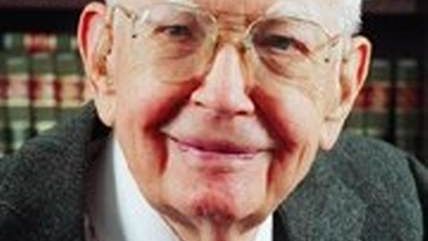RIP Ronald Coase, the Economist Who Hated Math
Ronald Coase's reach covered everything from the air we breathe to the airwaves through which we communicate.

Ronald Coase, winner of the 1991 Nobel Memorial Prize in Economics, died in September at age 102. Thomas Hazlett interviewed Coase in our January 1997 issue. In the introduction, Hazlett explained part of what made Coase unusual for an economist: "No one could remember a single equation, an estimated parameter, a correlation coefficient-nary a Greek symbol-in any of his articles."
Without math, Coase provided unusually fruitful insights that shaped the economics profession, producing two papers that remain among the most cited in the literature. The first was his 1937 article, "The Nature of the Firm," which, as Hazlett explained, outlined "the subtle logic of how firms pursue efficiency in a complicated world." The second was the 1960 essay "The Problem of Social Cost." That article looked at how market actions affected third parties. "Before Coase," wrote Hazlett, economic analysis maintained that the market "would predictably fail to achieve an optimal solution"-an idea Hazlett said "provided intellectual justification for a wide range of government interventions."
Coase's insight was "that once property was well-defined and easily tradable…the optimal social outcome would obtain no matter who owned the property.…Hence, whenever someone clearly possessed the right to pollute: Voila! Social efficiency! This became famously known as the Coase Theorem."
As editor from 1964 to 1982 of The Journal of Law and Economics, Coase led the application of economic thinking to legal questions, a field that has been hugely influential in both economics and law. Coase told Hazlett that though he was not an ideological libertarian, in his experience overseeing decades of studies of regulation, he found that "Regulation of transport, regulation of agriculture-agriculture is a, zoning is z. You know, you go from a to z, they are all bad."
Among other accomplishments, Coase also pointed out that, contra conventional wisdom, lighthouses could and did operate privately at a profit.
Coase's mark on the real world was profound. As The Wall Street Journal pointed out in its obituary, he "provided the intellectual framework for reducing pollution by trading carbon credits instead of enforcing antipollution laws, as well as for auctioning the airwaves for cellphones and pagers." His reach covered everything from the air we breathe to the airwaves through which we communicate-an impressive feat for an economist who disdained math.


Show Comments (238)